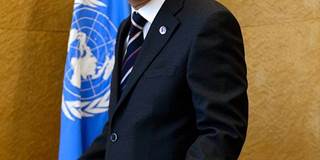As the international order becomes more fragmented, strong global-governance institutions are crucial for addressing the world’s collective challenges – and yet rarely have our existing institutions been weaker. To reinvigorate multilateralism, the UN, in particular, will need to make major organizational changes.
SHANGHAI – As the existing international order becomes more fragmented, strong global-governance institutions are crucial for addressing the world’s strategic, economic, and sustainability challenges. And yet rarely have our existing institutions – including, above all, the United Nations – been frailer.
The UN is not broken, but it is in trouble, particularly as more countries treat it as a polite diplomatic afterthought and seek solutions to major global problems elsewhere. We’ve seen this on issues ranging from Syria to Iran, North Korea, terrorism, cyber security, asylum-seekers and refugees, migration, Ebola, and the emerging crisis in humanitarian-aid funding.
While the UN still has many strengths, it also has clear structural weaknesses. The gap between what it aspires to do and what it actually does is growing. But the world needs a UN that not only deliberates on policy, but also delivers in the field.

SHANGHAI – As the existing international order becomes more fragmented, strong global-governance institutions are crucial for addressing the world’s strategic, economic, and sustainability challenges. And yet rarely have our existing institutions – including, above all, the United Nations – been frailer.
The UN is not broken, but it is in trouble, particularly as more countries treat it as a polite diplomatic afterthought and seek solutions to major global problems elsewhere. We’ve seen this on issues ranging from Syria to Iran, North Korea, terrorism, cyber security, asylum-seekers and refugees, migration, Ebola, and the emerging crisis in humanitarian-aid funding.
While the UN still has many strengths, it also has clear structural weaknesses. The gap between what it aspires to do and what it actually does is growing. But the world needs a UN that not only deliberates on policy, but also delivers in the field.